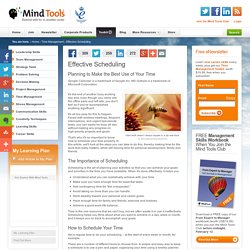

How to Make a Schedule You Can Stick To. Have you ever been surprised at how much you can fit in when you’re at a conference? When we have a schedule provided for us, we manage to get from one event to the next at the right time; the imposition of external timings means that even if we’d like to stick with one task a little longer, we move on quickly. We deal with emails in brief breaks, sending shorter replies than usual, ditching any junk without even opening it. In day to day working life, though, we tend to find ourselves struggling to stick to self-imposed schedules. One or two things overrun; emails and phone calls come in; our boss dumps an urgent task on us. However beautiful your schedule looks, just writing it out isn’t going to help you.
Don’t Over-Plan The biggest mistake which most of us make when it comes to scheduling is to over-plan. Whatever your job, you’re almost certainly going to have to face all sorts of little interruptions and hold-ups. Build in Margins …and so on. Margins also apply at a larger scale. Effective Scheduling - Time Management Training from MindTools. Planning to Make the Best Use of Your Time Google Calendar is a trademark of Google Inc.

MS Outlook is a trademark of Microsoft Corporation. Hard work doesn’t always equate to a job well done. © iStockphoto/SumikoPhoto It's the end of another busy working day and, even though you came into the office early and left late, you don't feel as if you've accomplished anything significant. It's all too easy for this to happen. That's why it's so important to know how to schedule your time properly.
The Importance of Scheduling Scheduling is the art of planning your activities so that you can achieve your goals and priorities in the time you have available. Understand what you can realistically achieve with your time.Make sure you have enough time for essential tasks.Add contingency time for "the unexpected. " Time is the one resource that we can't buy, but we often waste it or use it ineffectively. How to Schedule Your Time There are a number of different tools to choose from. The Pickle Jar Theory - Time Management Skills from MindTools. Make Your Schedule Work.

Leave Time for Fun! © iStockphoto/Ekely "Pickle Jar Theory" uses the analogy of an empty pickle jar to think about how we use the fixed amount of time available to us each day. If we think of it as we plan our schedule, we can get important work done while still leaving time for the small things that make life fun. Imagine a Huge Empty Pickle Jar... Firstly, forget about time management altogether, and just imagine that you have a huge empty pickle jar (think of the largest pickles you have ever seen).
Even though it seems full, you're not done yet. What This Means Now, back to time management. Sure, this analogy seems simplistic, even elementary. ... for the complete article: Mind Tools Club members, click here. Join the Mind Tools Club to finish this article AND get 1,000 more resources Join now for just $1, first month "When I started using Mind Tools, I was not in a supervisory position. Pickle Jar Theory.